Commercial Roof Replacement Cost in CT, RI, & MA – A Complete Guide
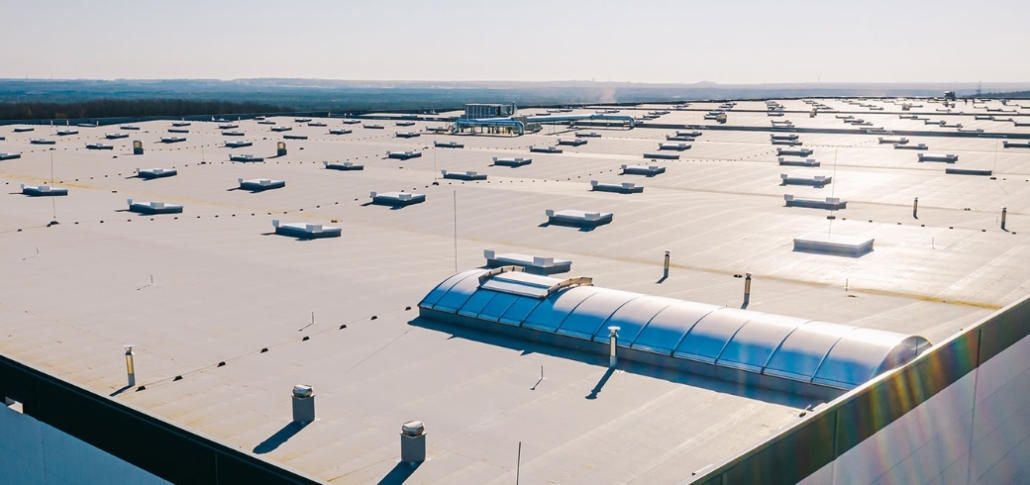
Commercial roof replacement cost is a significant consideration for property owners and facility managers, requiring careful planning and budgeting. Whether you’re in Connecticut, Rhode Island, or Massachusetts, understanding these costs is essential for maintaining the longevity and safety of your building. Replacing your commercial roof not only protects the structure but also influences energy efficiency, maintenance expenses, and property value.
Key Factors Affecting Commercial Roof Replacement Costs
- Pricing Range: for a general idea, commercial roof replacement typically costs between $12 – $16 per square foot, depending on the materials, roof complexity, and location. Keep in mind that larger or more specialized roofing projects may exceed this range.
Several factors impact the cost of commercial roof replacement, including:
- Roof Size & Complexity – Larger roofs and those with steep slopes or hard-to-reach areas require more labor and materials, increasing costs.
- Material Choice – Options range from budget-friendly asphalt shingles to premium materials like metal or specialized flat roofing systems.
- Labor & Regulations – Costs vary by state, with local wages, permitting fees, and building codes influencing overall expenses.
- Tear-Off vs. Overlay – A full tear-off is typically more expensive than adding a new layer due to removal and disposal costs.
- Weather & Seasonality – Harsh winters and peak demand periods can drive up labor and material costs.
Pricing Range: For a general idea, commercial roof replacement typically costs between $12 – $16 per square foot, depending on the materials, roof complexity, and location. Keep in mind that larger or more specialized roofing projects may exceed this range.
Understanding these factors helps you budget effectively and make informed decisions about your commercial roofing project. For a detailed, customized quote, contact National Roofing and Solar. Serving Connecticut, Rhode Island, and Massachusetts, our experts provide comprehensive roof inspections to help you plan with confidence.
Breakdown of Commercial Roofing Costs by Material Type
When considering a commercial roof replacement, selecting the right material is essential for balancing durability, cost, and performance.
Here’s a breakdown of common roofing materials used in CT, RI, and MA, along with their associated costs:
1. PVC Roofing ($7 – $12 per sq. ft.)
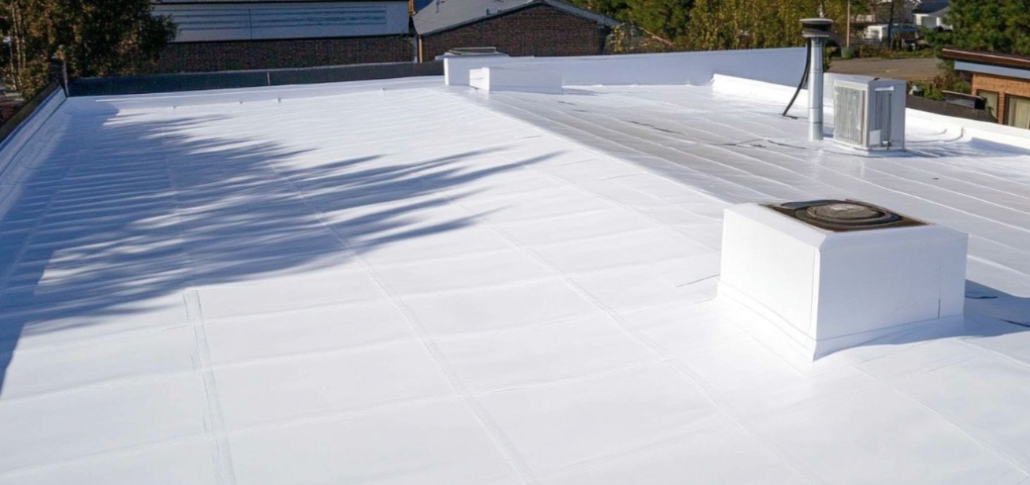
PVC (Polyvinyl Chloride) roofing is known for its durability and energy efficiency.
It’s highly resistant to harsh weather, chemicals, and UV rays, making it ideal for long-term performance. Additionally, PVC’s reflective surface helps reduce cooling costs in hot climates, improving energy efficiency.
Commonly used for flat or low-slope roofs, PVC is known for its ability to prevent water pooling, extending the roof’s lifespan. While it tends to be more expensive upfront, its low maintenance and energy-saving benefits often make it a cost-effective option in the long term. When considering commercial roof replacement cost, PVC is a solid investment due to its durability and reduced utility expenses over time.
2. TPO Roofing ($5- $15 per sq. ft.)

TPO (Thermoplastic Olefin) roofing provides a cost-effective solution with excellent reflectivity, helping to lower energy consumption. It’s highly durable and resistant to UV degradation, making it ideal for flat-roofed commercial properties. Known for its longevity, TPO offers a strong balance between cost and performance, making it a popular choice for many businesses.
For more information on TPO roofing systems and their benefits, and learn about TPO roofing costs, visit HomeGuide’s TPO roofing cost guide.
3. EPDM Roofing ($12- $16 per sq. ft.)
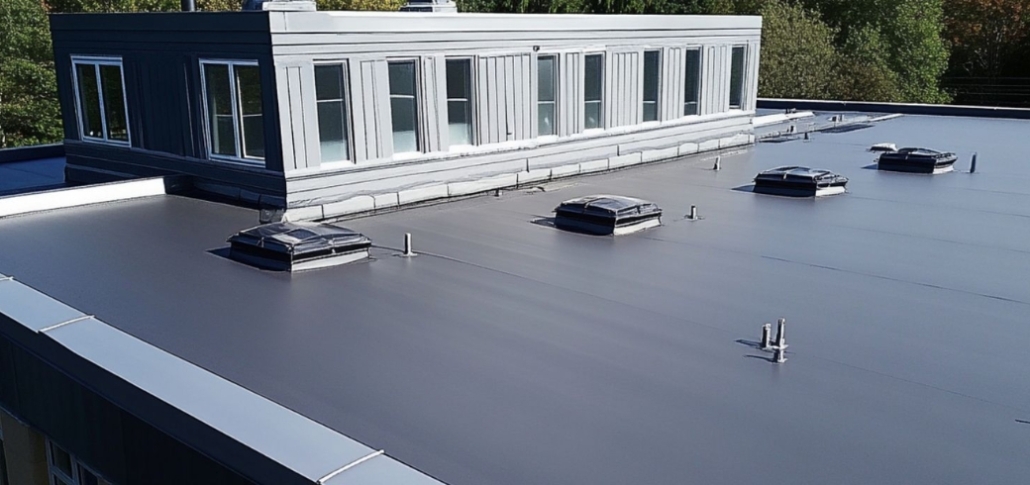
EPDM (Ethylene Propylene Diene Monomer) is an affordable roofing option ideal for flat roofs, offering excellent value for commercial properties. Known for its long lifespan, EPDM is highly resistant to extreme weather conditions, making it suitable for areas with fluctuating climates. In regions like New England, it effectively withstands both harsh winters and hot summers.
As one of the most budget-friendly roofing options, EPDM provides lasting performance at a lower cost. For more details on EPDM roofing and its benefits, visit Roofing Solar Corp’s EPDM Roofing services.
4. Asphalt Roofing ($3.50 – $7.50 per sq. ft.)
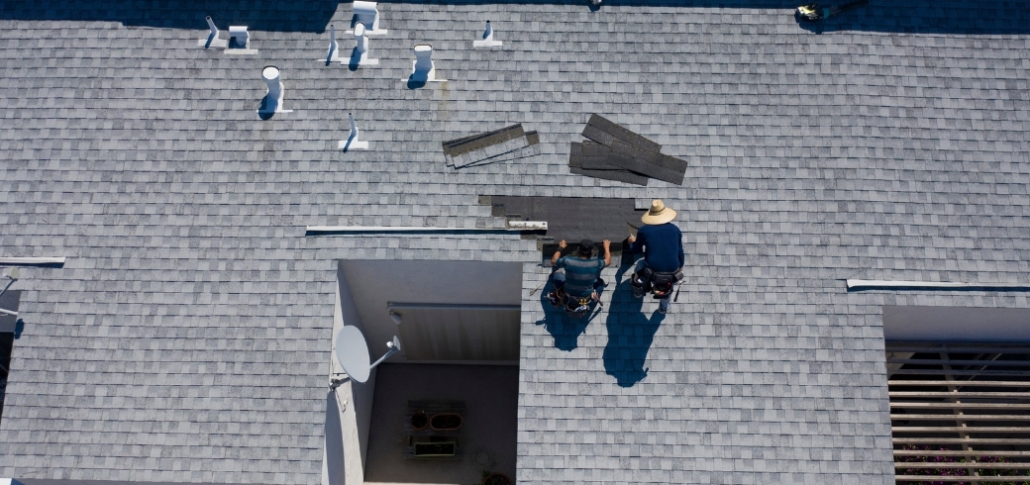
Asphalt roofing, the traditional choice for many commercial buildings, remains a popular option due to its cost-effectiveness and ease of installation.
While asphalt can be a reliable material, it may not provide the same level of energy efficiency or durability as some of the newer roofing materials.
It’s ideal for buildings with a sloped roof, though it requires more frequent maintenance than other materials.
Read More: Commercial Roof Replacement Process – Step-by-Step Guide
5. Metal Roofing ($8 – $16 per sq. ft.)
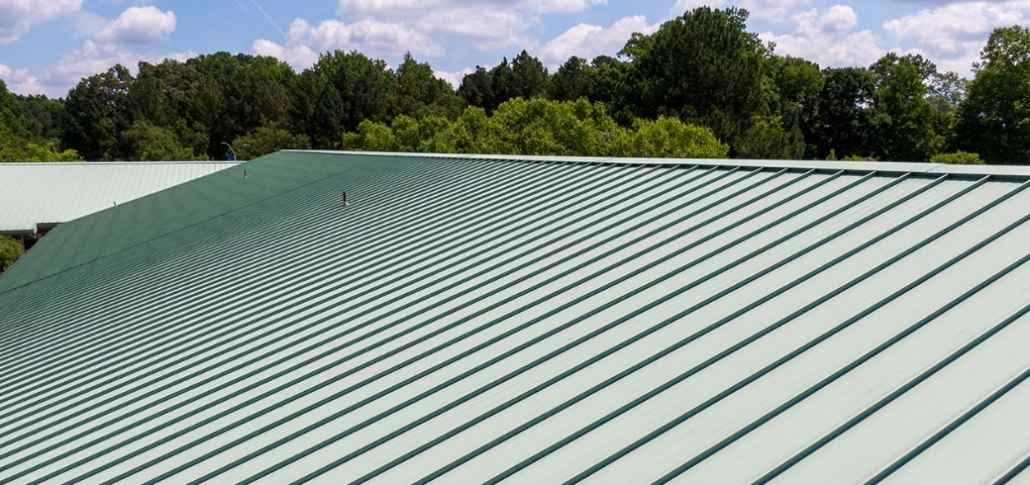
Metal roofing is known for its high durability and long lifespan, often lasting 40+ years. This premium roofing option is ideal for commercial buildings looking for a long-term solution.
While it’s more expensive initially, depending upon metal materials used, its ability to withstand extreme weather and its energy efficiency make it a worthwhile investment in the long run.
6. Shingle Roofing ($6- $10 per sq. ft.)
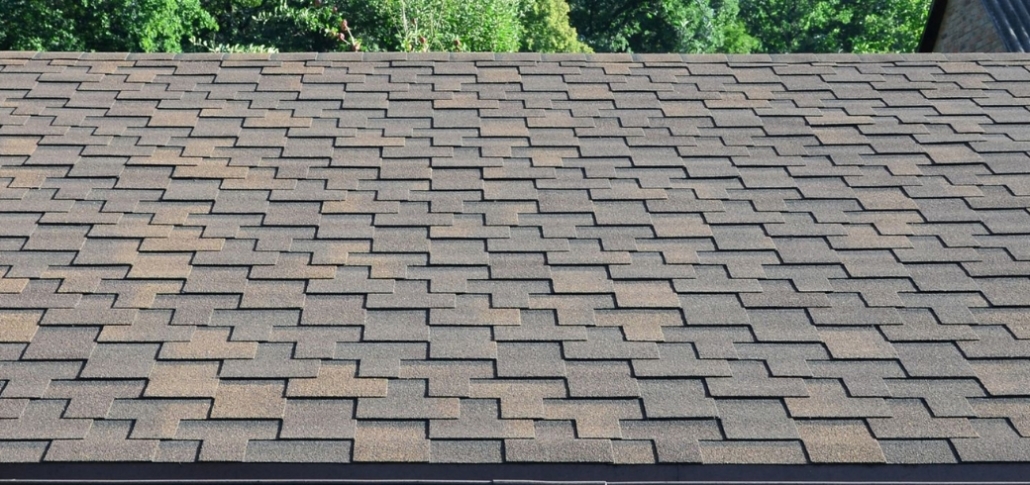
While shingle roofing is more commonly associated with residential properties, it can be a cost-effective choice for certain commercial buildings, especially smaller structures.
Asphalt shingles offer a traditional look and are relatively inexpensive compared to other roofing materials.
However, they may not be as durable as options like metal or EPDM, and they aren’t ideal for larger commercial buildings or those with flat roofs.
By understanding commercial roof replacement cost of roofing material, property owners in CT, RI, and MA can make an informed choice that aligns with both their budget and the unique needs of their commercial building.
Request A Free Quote
Speak To Our Roofing Specialists Today!
National Roofing & Solar offers expert commercial roof replacements, leak repairs, and solar upgrades, maximizing energy efficiency and ROI.
Hidden Costs to Consider
When planning for a commercial roof replacement, it’s important to factor in potential hidden costs that can significantly impact your budget.
These additional expenses may not always be immediately obvious but are essential to ensuring the longevity and effectiveness of your new roof.
Some of the hidden costs that may arise during a commercial roof replacement project include:
1. Structural Repairs and Decking Replacement
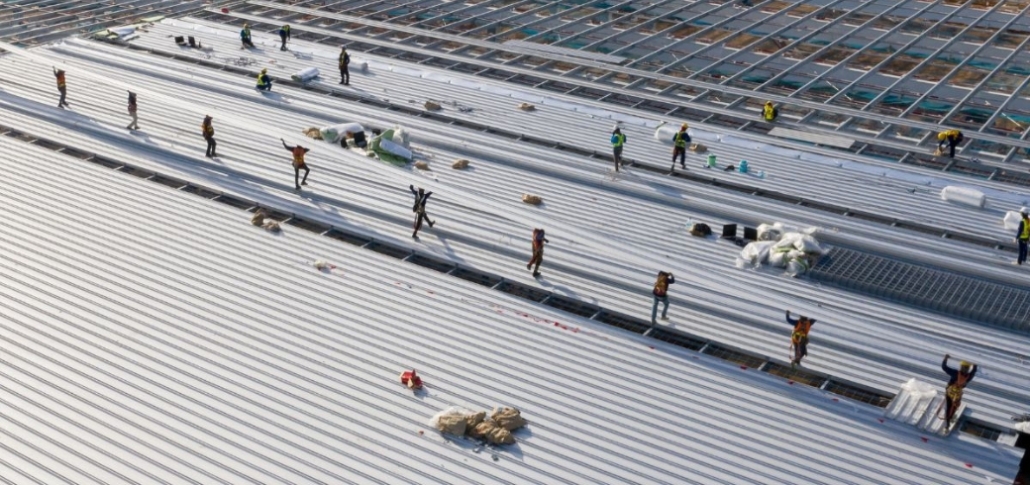
In some cases, the existing roof deck or structural components may require repairs or replacement during the roof replacement process.
This is especially common in older buildings where the deck may have been damaged by water, wear, or weather.
These repairs can add significant costs to the project, as replacing the decking or reinforcing the structure will require both additional materials and labor.
2. Insulation Upgrades
In New England, energy efficiency is a top priority due to the harsh winters and fluctuating temperatures.
As a result, property owners may need to upgrade insulation as part of their commercial roof solutions to meet local energy efficiency standards..
Proper insulation can help reduce energy costs and improve the comfort of the building, but it’s an added expense that should be factored into your overall budget.
3. Drainage Systems and Code Compliance
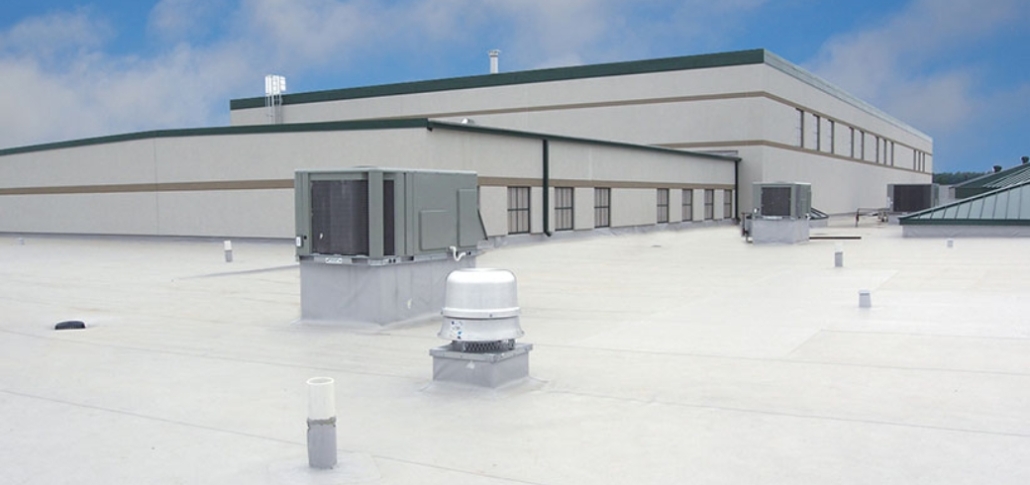
A roof’s drainage system is crucial for preventing water accumulation and potential damage.
Depending on the condition of your existing drainage system, you may need to upgrade or replace it to ensure proper flow.
Additionally, local building codes in CT, RI, and MA may require specific drainage standards to be met during a roof replacement, adding further costs to ensure compliance with municipal regulations.
Request A Free Quote
Speak To Our Roofing Specialists Today!
National Roofing & Solar offers expert commercial roof replacements, leak repairs, and solar upgrades, maximizing energy efficiency and ROI.
4. Disposal Fees and Landfill Costs
Tearing off an old roof can result in significant waste, including roofing materials, insulation, and other debris.
Disposal fees for roofing materials can be a hidden cost that many property owners overlook when budgeting for a roof replacement.
These fees can vary based on the volume of debris and local landfill regulations, so it’s important to budget for proper waste disposal and recycling options.
By accounting for these hidden costs upfront, property owners in CT, RI, and MA can avoid unpleasant surprises and ensure they’re fully prepared for the cost of a commercial roof replacement.
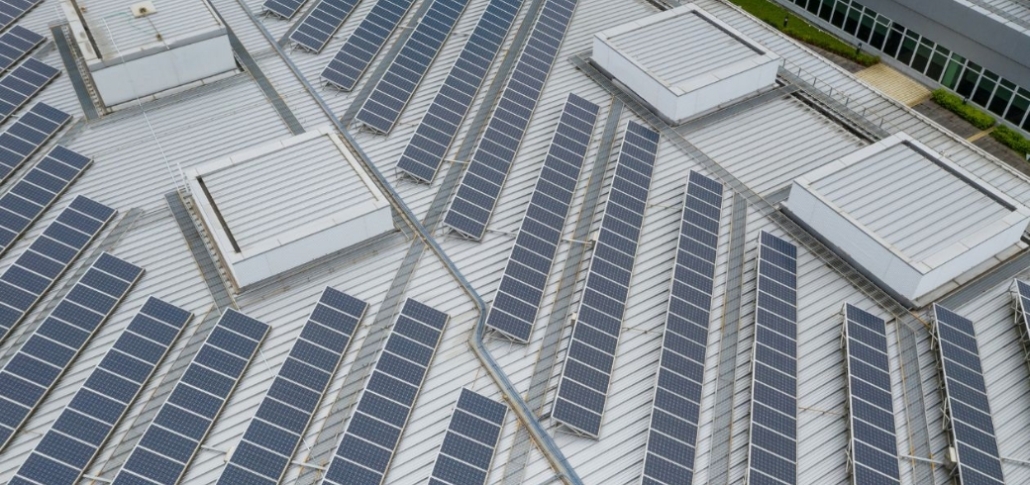
Local Tax Incentives & Financing Options
When planning a commercial roof replacement, it’s also important to explore potential state-specific rebates and incentives that can help reduce the overall commercial roof replacement cost.
Each state in New England offers commercial roof financing programs designed to support energy efficiency, renewable energy, and green building practices.
Here’s a look at some of the key programs available in Connecticut, Rhode Island, and Massachusetts:
1. Connecticut: C-PACE Financing, Energy Efficiency Grants
In Connecticut, businesses can take advantage of the C-PACE (Commercial Property Assessed Clean Energy) financing program, which provides low-interest financing for energy-efficient building upgrades, including roof replacements.
Additionally, Connecticut offers various Energy Efficiency Grants that may be available for property owners who are upgrading their roofs to improve energy efficiency.
These incentives can help offset some of the costs associated with installing energy-efficient roofing materials and systems.
2. Rhode Island: Renewable Energy Fund (REF), Green Bank Loans
Rhode Island’s Renewable Energy Fund (REF) supports businesses that invest in renewable energy technologies, which may include solar roofing systems as part of a commercial roof replacement project.
Additionally, the Rhode Island Green Bank offers Green Bank Loans to help finance energy-efficient and renewable energy projects, including roofing replacements that meet green building standards.
These programs can be a valuable resource for businesses looking to reduce their environmental impact and lower long-term energy costs.
3. Massachusetts: Mass Save, Solar + Roofing Tax Credits
In Massachusetts, Mass Save is a popular program that offers incentives for energy-efficient upgrades, including roof replacements that improve a building’s insulation and energy performance.
Massachusetts also provides Solar + Roofing Tax Credits, which allow property owners to benefit from tax credits when installing solar roofing systems as part of their roof replacement project.
These incentives can significantly reduce both the upfront cost and long-term energy expenses for businesses in the state.
By taking advantage of these state-specific rebates and incentives, property owners can lower the commercial roof replacement cost and invest in energy-efficient, environmentally friendly roofing systems that provide long-term savings.
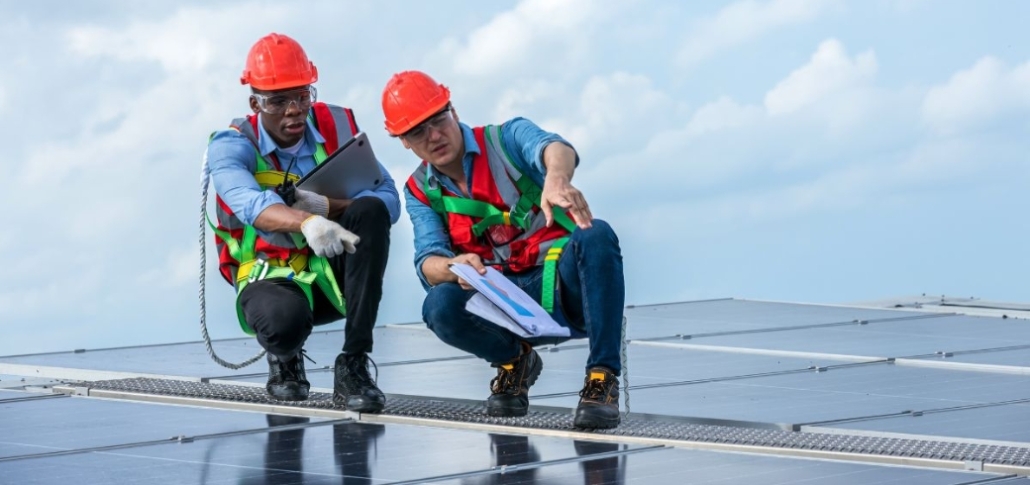
Commercial Roof Financing Programs
In addition to state-specific rebates and incentives, businesses can also explore commercial roof financing programs to help manage the upfront costs of a roof replacement.
One popular option is PACE Financing (Property Assessed Clean Energy), which is available in several states, including Connecticut and Massachusetts.
PACE financing allows property owners to secure low-interest loans for energy-efficient upgrades, including roof replacements, and repay the loan through property taxes over time.
This option can help businesses manage the cost of a new roof by spreading payments out, making it more financially manageable.
Another consideration for financing is the choice between leasing vs. buying when it comes to energy-efficient roofs.
Leasing options allow businesses to install energy-efficient roofs without the large upfront cost, while spreading payments over a fixed period.
Leasing can be an attractive option for businesses that want to conserve capital or prefer predictable monthly payments.
On the other hand, purchasing a roof outright may provide long-term savings, as the business will own the roof and benefit from any energy savings or tax incentives directly.
Ultimately, choosing between leasing and buying depends on the business’s financial situation, long-term goals, and available incentives for energy-efficient investments.
Read More: What is the Best Commercial Roofing Material? The Full Guide
Request A Free Quote
Speak To Our Roofing Specialists Today!
National Roofing & Solar offers expert commercial roof replacements, leak repairs, and solar upgrades, maximizing energy efficiency and ROI.
Take Advantage of Local Tax Incentives and Financing Options Today!
Don’t miss out on the rebates and financing programs available to you. Contact National Roofing and Solar to explore how local incentives can reduce your commercial roof replacement cost.
Our team will help you navigate available tax credits, financing options, and energy-efficient solutions tailored to your property. Serving Connecticut, Rhode Island, and Massachusetts, we’re ready to help you make the most of these valuable opportunities.
Get in touch today for a free consultation and start saving!
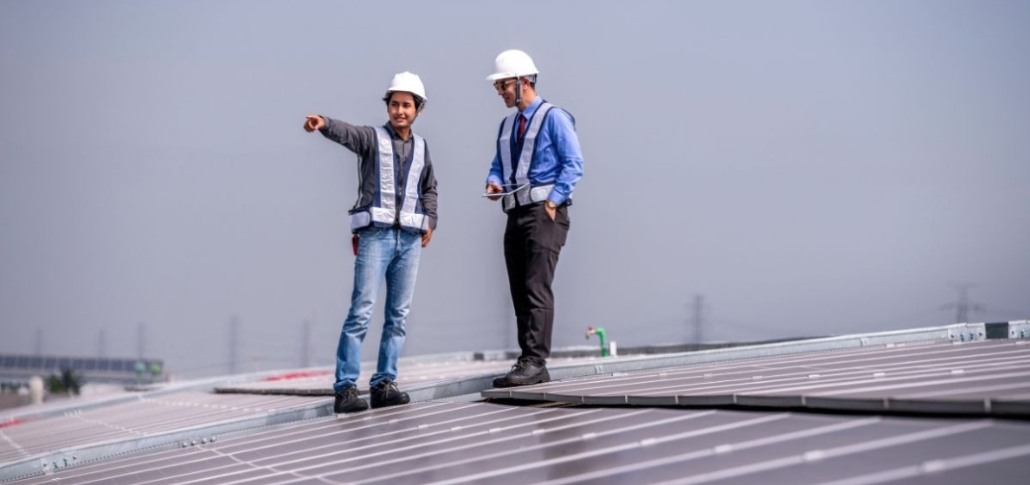
Choosing the Right Commercial Roofing Contractor
When it comes to managing your commercial roof replacement cost, selecting the right roofing contractor is crucial to ensuring a successful project.
A qualified contractor can help you navigate the complexities of roof replacement, providing you with accurate estimates, high-quality work, and long-term value.
Here are some key considerations when hiring a roofer in Connecticut, Rhode Island, and Massachusetts:
Licensing and Insurance Requirements
Before hiring a contractor, ensure they are properly licensed and insured. In all three states—CT, RI, and MA—roofing contractors are required to have specific licenses and insurance coverage to operate legally.
This includes general liability insurance to protect you from accidents on the job site and worker’s compensation to cover any injuries to workers.
Hiring a contractor without the appropriate credentials can expose you to unnecessary risks, so always ask to see their license and proof of insurance before moving forward.
How to Get Accurate Estimates and Avoid Hidden Fees
Getting accurate estimates is essential for managing your commercial roof replacement cost and staying within budget.
It’s important to gather estimates from multiple contractors to compare pricing and services. Be sure the estimate includes all aspects of the project, including materials, labor, disposal, and any potential repairs needed.
Avoid contractors who offer significantly lower estimates, as this can be a red flag for hidden fees or subpar materials.
Always ask for a detailed, written contract that outlines the scope of work, timelines, and payment schedule to help prevent unexpected costs from arising during the project.
By taking the time to vet contractors thoroughly, you can ensure you’re hiring a reliable professional who will deliver quality results without surprises.
FAQs- Everything you Need to Know About Commercial Roof Replacement
The duration of a commercial roof replacement depends on factors like the size and complexity of the roof. On average, commercial roof solutions can take anywhere from a few days to a couple of weeks. Larger or more intricate roofs may require more time. Weather conditions and material availability can also affect the timeline, so it’s always best to get an estimate from your contractor.
Yes, roof replacements can be done in winter, but New England’s cold temperatures and unpredictable weather can make the process more challenging. Cold weather can affect materials like asphalt shingles, which may become brittle. However, if your roof is severely damaged, it’s better to replace it during winter rather than risk further damage. A roofing contractor will assess the situation and help determine the best time to proceed.
For New England’s harsh winters and fluctuating temperatures, materials like metal roofing, EPDM, TPO, and PVC are ideal. These options are known for their durability and ability to withstand snow, ice, and temperature extremes. Choosing the right material depends on your building’s design, energy efficiency goals, and budget.
If your roof is older than 20 years or has widespread damage, it may be time for a full replacement. Other signs include frequent leaks, structural issues, or worn-out materials. However, if the damage is minor and localized, repairs may be enough to extend the life of the roof. A professional roofing contractor can help you evaluate the condition of your roof and recommend the best course of action.
Request A Free Quote
Speak To Our Roofing Specialists Today!
National Roofing & Solar offers expert commercial roof replacements, leak repairs, and solar upgrades, maximizing energy efficiency and ROI.
Get a Commercial Roof Inspection Today!
Ready to ensure your commercial roof is in top condition? Contact National Roofing and Solar for a thorough roof inspection and consultation.
Our expert team will assess your roof’s condition, provide a customized solution, and offer a detailed quote tailored to your needs. Whether you’re in Connecticut, Rhode Island, or Massachusetts, we’ve got you covered. Don’t wait—schedule your free consultation today and protect your investment with a reliable, energy-efficient roof. Reach out to us now!


